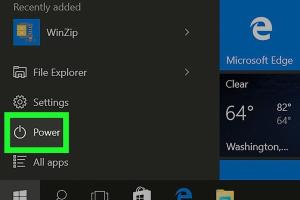Ultimate Guide to Restarting Windows 10: Step-by-Step Instructions and Tips

-
Quick Links:
- 1. Introduction
- 2. Why Restart Windows 10?
- 3. Different Methods to Restart Windows 10
- 4. Step-by-Step Guides
- 5. Troubleshooting Common Issues
- 6. Real-World Case Studies
- 7. Expert Insights
- 8. Conclusion
- 9. FAQs
1. Introduction
Restarting your Windows 10 operating system may seem like a simple task, but it plays a crucial role in maintaining your computer's performance and resolving various issues. Whether you’re dealing with sluggish performance, system updates, or software glitches, knowing how to restart Windows 10 correctly can make all the difference.
2. Why Restart Windows 10?
There are several reasons why you might need to restart your Windows 10 machine:
- Applying updates: Windows frequently releases updates that require a restart to take effect.
- Performance issues: Restarting can clear memory and terminate processes that are causing slowdowns.
- Software installation: Many applications require a restart post-installation to function properly.
- Fixing glitches: A simple restart can resolve many minor system glitches and bugs.
3. Different Methods to Restart Windows 10
Windows 10 offers several methods to restart your system. Below, we’ll explore each method in detail:
- Method 1: Using the Start Menu
- Method 2: Keyboard Shortcut
- Method 3: Command Prompt
- Method 4: Power User Menu
- Method 5: Windows Settings
Method 1: Using the Start Menu
- Click on the Start button located in the bottom-left corner of your screen.
- Select the Power icon.
- Choose Restart from the list of options.
Method 2: Keyboard Shortcut
For a quick restart, you can use the following keyboard shortcut:
- Press Alt + F4 on your desktop.
- Select Restart from the dropdown menu.
- Click OK.
Method 3: Command Prompt
If you prefer using the Command Prompt, follow these steps:
- Type cmd in the Windows search bar and press Enter.
- Type the command shutdown.exe /r /t 0 and hit Enter.
Method 4: Power User Menu
For advanced users, the Power User Menu is a handy tool:
- Right-click on the Start button.
- Hover over Shut down or sign out.
- Select Restart.
Method 5: Windows Settings
You can also restart your computer through the Settings menu:
- Open Settings by clicking on the gear icon in the Start menu.
- Select Update & Security.
- Click on Recovery.
- Choose Restart now under Advanced startup.
4. Step-by-Step Guides
This section provides in-depth guides for common scenarios where a restart is necessary, including after updates and software installations.
Guide: Restart After Updates
After Windows updates, it is essential to restart your system. Follow these steps:
- Go to Settings.
- Select Update & Security.
- Click on Check for updates.
- If updates are available, click on Download and then Install.
- Once the updates are installed, click on Restart now.
Guide: Restart to Fix Performance Issues
If your computer is running slowly, a restart can help:
- Close all open applications.
- Follow any of the restart methods discussed above.
5. Troubleshooting Common Issues
Even after performing a restart, users may encounter issues. Here are some common troubleshooting steps:
- Check for additional updates if the system does not restart as expected.
- Run the Windows Troubleshooter for performance problems.
- Ensure all hardware is connected properly, especially after removing devices.
6. Real-World Case Studies
In this section, we will discuss case studies demonstrating the importance of regular restarts for system health and performance. For example, a study by Microsoft found that users who regularly restarted their devices experienced a 30% reduction in system errors.
7. Expert Insights
Experts recommend establishing a routine for restarting your computer to enhance performance. Regular restarts can help clear temporary files and improve overall system speed.
8. Conclusion
Restarting Windows 10 is a straightforward process, but understanding when and how to do it effectively can greatly enhance your computing experience. This guide has outlined various methods and scenarios for restarting your system, as well as troubleshooting tips for common issues.
9. FAQs
1. What is the quickest way to restart Windows 10?
The quickest way is to press Alt + F4 on your desktop and select Restart.
2. Why is my Windows 10 not restarting?
This could be due to pending updates or software conflicts. Check for updates and try restarting again.
3. How often should I restart my computer?
It’s advisable to restart your computer at least once a week, especially after updates.
4. Can I restart Windows 10 from the command line?
Yes, use the command shutdown.exe /r /t 0 in Command Prompt.
5. Does restarting Windows 10 delete any files?
No, restarting does not delete any files. It simply refreshes the system.
6. What should I do if my computer freezes during a restart?
Try holding down the power button until it shuts off, then turn it back on.
7. Will a restart fix a slow computer?
A restart can help by clearing temporary files and freeing up system resources.
8. How do I restart Windows 10 if my Start menu is not working?
You can use the keyboard shortcut Ctrl + Alt + Delete and select the power icon to restart.
9. Can I configure Windows 10 to restart automatically?
Yes, you can schedule restarts through the Windows Update settings.
10. What does a restart do to my programs?
All open programs will be closed during a restart, so make sure to save your work beforehand.
For more detailed information on Windows 10 management, visit:
- Microsoft Support - Windows 10 Help
- How-To Geek - How to Restart Your Windows 10 PC
- Laptop Mag - How to Restart Windows 10
Random Reads